Page 2 of 5
Re: Conn 20j
Posted: Tue Oct 11, 2016 10:49 pm
by andrew the tuba player
Ah ok. He can definitely handle it. Once again I'm new to all of this and he explained alot of what you just told me but I didn't really understand it. He did have sleeves but I think none of the ones he had were big enough. I was only there for about 20 minutes so not really long enough for us to dive into it together. I left it with him for now so he can look into all of the options for repair and replacement. Sorry for the confusion. Once again my repair tech is great it's just that I'm not so great at understanding and relaying what all is going on.
The valve also has some pretty deep grooves from the hang up and one of the ports has a puncture in it. I honestly can't remember ever seeing that puncture so I'm not sure of maybe that happened after I took it back or what. I would definitely remember doing it if I had though.
Re: Conn 20j
Posted: Tue Oct 11, 2016 11:15 pm
by royjohn
Andrew,
Not surprised he didn't have a sleeve for this valve...I don't think it is even listed in the Ferree's catalog but they can make up one for the size you need. You can see that this is not simple, but it should be doable. A puncture in the port is also something that needs some dexterity to fix, but should be doable, too. The sleeve tool would be about $45, I think. So with all the work to go into the valve, you'll need an estimate. Then it may be easier/cheaper just to hone the casing sleeve round and have a MAW valve made up to match your casing diameter. It looks like this can work out, but may be a little more than you really want to pay.
I got my 20J for about $600 and put $150 into some preliminary dent work, but I see that they're for sale for more like $2K and more, so your investment will be worth it. And, as you know, it's got the sound...

Re: Conn 20j
Posted: Wed Oct 12, 2016 12:27 am
by andrew the tuba player
And that's what it all boils down to is money. If I had money I'd throw some MAW valves in it and make this horn amazing. But I don't

And having a great workhorse already, it's hard to justify a whole lot of money.
But then again I do want it to play again so if that means waiting a long time and saving up the money then I will.
By the way here are some pictures of the valve so we all know what going on with it.
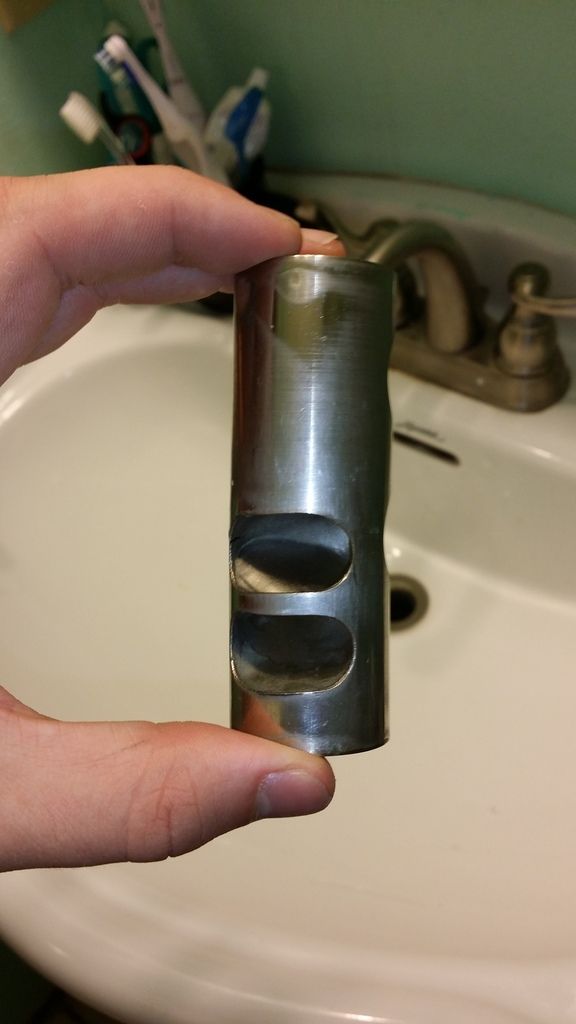
^You can see the slight bow if you look from the top port up the valve
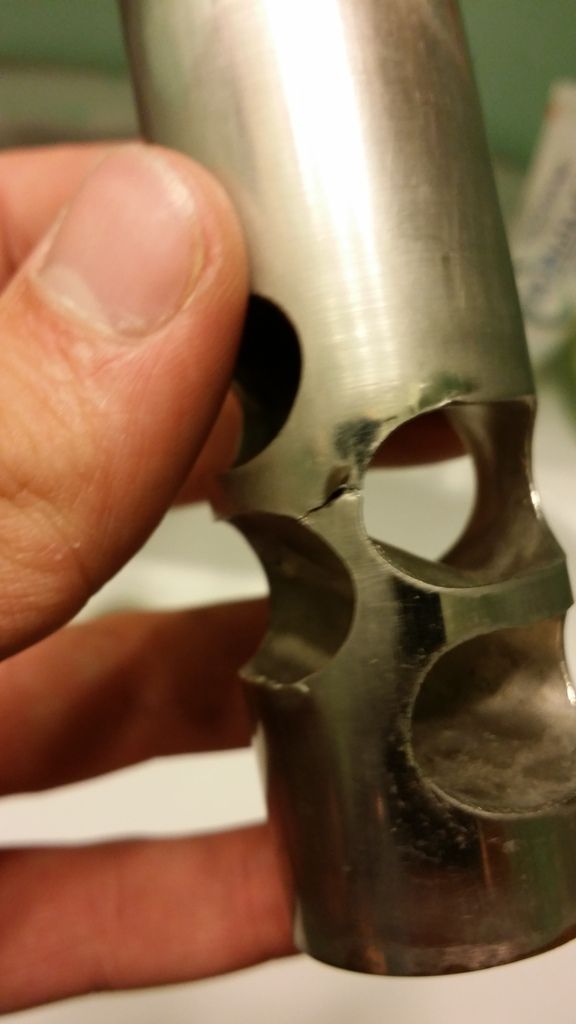
^Tear on the outside of the port
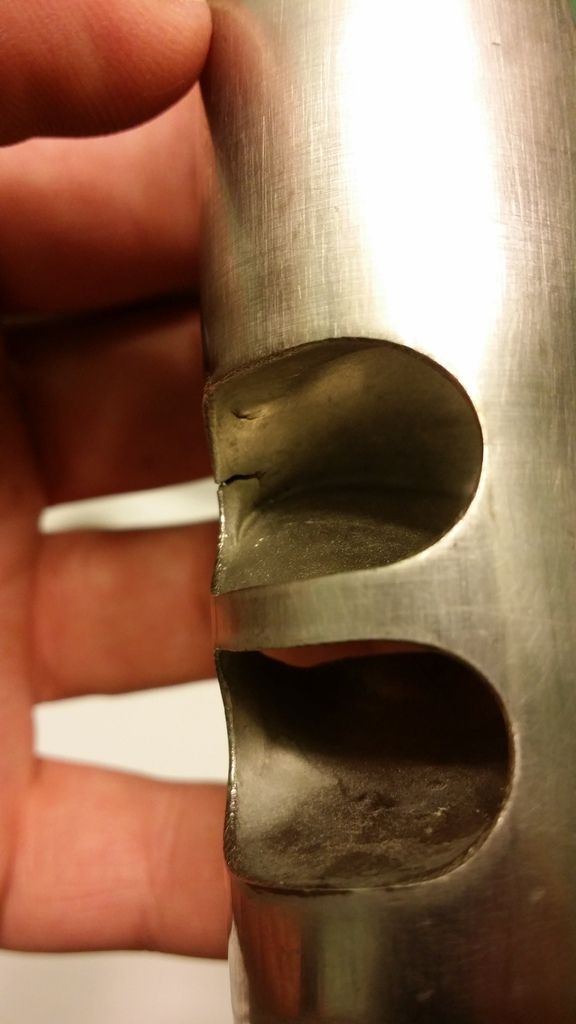
^ Crack Inside of the same port as the tear
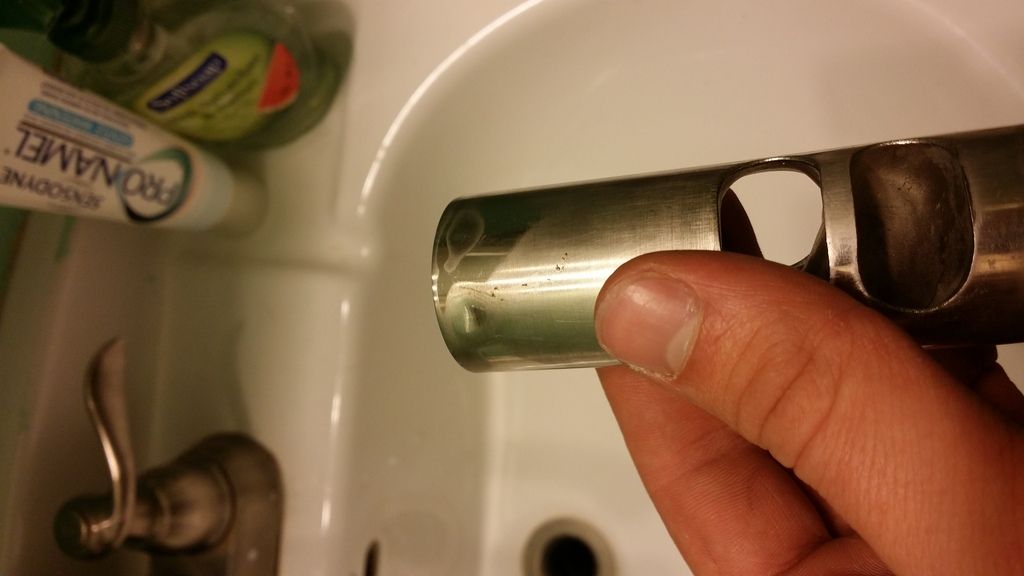
^Drag mark (there's also one on the top but I couldn't get a good picture of it)
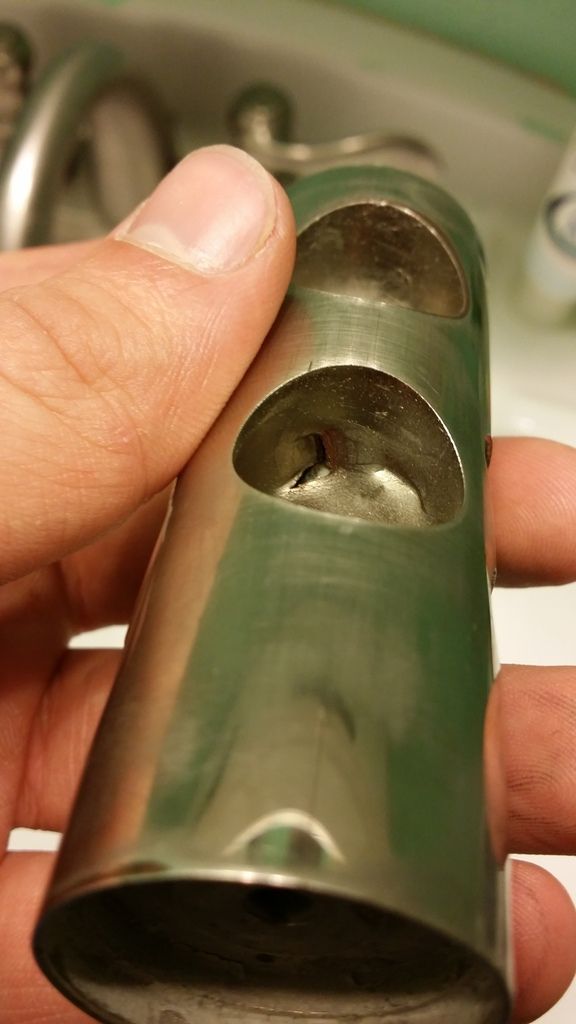
^Puncture in the top of the port.
Re: Conn 20j
Posted: Wed Oct 12, 2016 8:43 am
by Three Valves
epoxy won't fix??
Re: Conn 20j
Posted: Wed Oct 12, 2016 2:59 pm
by royjohn
If fixing, the work order would be, I believe:
1. Straighten valve in sleeve
2. Hand burnish/smooth tears
3. Solder tears
4. Round valve in blocks
5. Hone casing to round
6. Strike (copper plate) valve to size
7. Nickel plate valve
8. Lap and fit valve to casing
While the work above, outside of the plating which would be outsourced (to Anderson?), doesn't amount to much more than two or three hours, I forgot about the need to remove the whole valve block to do this...even if you got a new valve, it's likely the casing is marred and would need honing, so the block has to come out. Making the whole deal a fairly expensive proposition. Sigh!



Has anyone figured out a way to do this kind of repair without removing the valve block?
Re: Conn 20j
Posted: Wed Oct 12, 2016 5:12 pm
by andrew the tuba player
That's one of the thing we are looking at as well. I looked in the casing and couldn't see or feel any damage but he is going to go over it and get back to me. Thanks for all the info in it. This Is really turning into and informative project. I hope the block doesn't have to come out but we'll see what we find.
Re: Conn 20j
Posted: Wed Oct 12, 2016 7:18 pm
by The Big Ben
You could buy an entire 20J for much less than these other things. Only restored 20Js on eBay this week but beat up ones are common.
Does the person you are thinking of have the skill set to successfully do this?
Re: Conn 20j
Posted: Wed Oct 12, 2016 9:17 pm
by royjohn
It is easy enough to put a dial gage into the bore of the casing and see how far out of round it might/might not be. I've always wondered why people seem to unfailingly remove the valve block when doing the valves, because on many horns, a hone attached to a drill would be easy to pull in and out to hone the casing. I didn't think this was the case on the 20J, but I pulled mine out tonight and I see that there is plenty of clearance along the casing's axis to get a hone in and out. So AFAIK, there isn't a need to remove the valve block. But IDK whether anybody who actually does this work would agree with me. Depending on what your tech charges per hour and what Anderson charges to replate the valve, maybe you would get away for $300 or so. That's less than even a very beat up 20J. IDK of any for less than $500-$700 and up.
And like I say, "the sound, Watson, the sound!"

Re: Conn 20j
Posted: Wed Oct 12, 2016 10:54 pm
by andrew the tuba player
Well I won't be buying a 'new' one. The reason I'm willing to wait on and save for this one is because it has sentimental (that dirty dirty 'S' word) value. I do love the horns no doubt, but as stated I have a great workhorse that will get me through most everything I need right now.
Now that being said if I get the valve debacle and a few other projects done I will be wanting to build or buy an upright bell and if that happens it will definitely see a lot more use.
And yes my repair man has the skill set. He's rebuilt a lot of instruments from the ground up and done a lot of valve work on them. I'm just not good at relaying what he tells me because I'm still learning.
Also something that I forgot to mention as I was reading over the post the 'original first valve' does not match the other serial numbers! 2 and 3 are original but the 1st is not. Also 2 and 3 look great. They have some wear but not nearly as bad as I thought they'd be.
Re: Conn 20j
Posted: Thu Oct 13, 2016 12:20 am
by The Big Ben
royjohn wrote:It is easy enough to put a dial gage into the bore of the casing and see how far out of round it might/might not be. I've always wondered why people seem to unfailingly remove the valve block when doing the valves, because on many horns, a hone attached to a drill would be easy to pull in and out to hone the casing. I didn't think this was the case on the 20J, but I pulled mine out tonight and I see that there is plenty of clearance along the casing's axis to get a hone in and out. So AFAIK, there isn't a need to remove the valve block. But IDK whether anybody who actually does this work would agree with me. Depending on what your tech charges per hour and what Anderson charges to replate the valve, maybe you would get away for $300 or so. That's less than even a very beat up 20J. IDK of any for less than $500-$700 and up.
The objective of honing a valve casing is to both get it round and to get both sides parallel. The casing is trued and measured and then the piston is plated and honed to the size of the casing. It needs to be done within .001" precision. A hone on a drill motor can't do that. This job demands more precision than a car/truck brake master cylinder.
I suppose you could straighten the piston and/or machine it so it is true. It inevitably would be loose in the casing so you would have to have it plated bigger and then machined to whatever the size of the casing is. If the casing is not straight and true, the piston is not going to work very well because the piston is straight and true and the casing isn't. When valves are "sent to Anderson" usually the blocks and pistons go and Anderson does this procedure.
That's why I asked if the tech had the skill set and machines to do the job properly. If your present first valve could be repaired and resurrected and you have the other two done while you have it apart, when properly machined, they will feel like a dream. I've had it done. You might be able to find a piston and maybe plate it and hone it to whatever the casing is and it will work OK. Or machine it a little loose and use thick oil. If the casing is munged and is a long ways from being straight and round, the results may not be satisfactory.
I think the MAW valves are intended for new horns/rebuild horns which have straight and true casings at the start. His website does not exactly say but I'd guess you would send the dimension of the casing and the valves that are sent finished to fit properly in the casing. Someone correct me if I am wrong but, to me, that is the only way to do it.
I had this job done on a 4v Olds tuba and it was not cheap (Very much more than your $300.) but it is good. When you commission specialized work, you can count on it being specialized price. I've let players have a toot on the horn and the first thing they always say is "Man! Great valves!" You might ask Anderson how much their job of honing the casing and plating and honing the piston would cost if you sent the set into them.
This is how Anderson does it:
http://www.andersonsilverplating.com/valve_work.html" target="_blank
Scroll down to the end of this page and see how Oberloh does it in his shop:
http://www.oberloh.com/gallery/shop2.htm" target="_blank
Re: Conn 20j
Posted: Thu Oct 13, 2016 1:23 am
by roweenie
Anderson will most likely require removal of the valve nest before doing any valve casing work, such as honing, etc., especially on a horn that size.
Since I'm not familiar with the layout of the 20J, I'm wondering if using a hone mounted in a drill motor, on a top-action horn, is a possibility (clearance from above, top branch in the way, etc..)
If you are in Arkansas, I'd recommend a trip to see Martin W. personally - he's a few miles north of Louisville, Ky., in southern Indiana. I'm certain he could repair that piston - it's at least worth your time to give him a call.
Maybe a long shot, but is it remotely possible that Allied might have some N.O.S. parts for the 20J?
Re: Conn 20j
Posted: Thu Oct 13, 2016 1:29 am
by royjohn
I apologized for my imprecise terminology. The "hone" of which I am speaking is a casing reamer. These are produced in sizes that allow a small amount of expansion, maybe 0.010" or so. They ARE used with a lathe OR a drill and they are run in and out of the casing about an inch or two in each direction. We are NOT talking about an auto brake cylinder hone here, despite my imprecise terminology. Before you begin to demur or deny, realize that the reamer uses its precise cylindrical shape and the walls of the cylinder to produce a round cylinder to within about 0.0005" precision. The fact that it is mounted in a drill does not reduce its precision. I've forgotten the name of the company that sells these, or I'd link to it. Maybe it will come to me tomorrow.
Re: Conn 20j
Posted: Thu Oct 13, 2016 8:18 am
by andrew the tuba player
That's why I asked if the tech had the skill set and machines to do the job properly.
Ok. Sorry about the confusion. As far as the plating goes I'm not sure. I do know that he can do all of the work up to and including the casing work but if it has to be honed and plated at the same time I'm not sure. I'm still waiting to see what he says about the casing condition. He did say if we are going the repair route that he will contact any other shops if he needs them and get back to me with what they say.
Quoted from Anderson ' s Site:
Piston - Hone To Size
Honing only the pistons to size is a job option typically requested by repair shops only. Final fit is performed by a technician. For this job type, we only require the pistons(s) to be worked on and the specific size required for each. We will strip, prepare, and nickel plate the pistons slightly beyond the requested size. Then hone them back down to the exact size. Note that no casing work is performed under this option. It is the customers responsibilty to provide accurate measurements in writing of desired size, at minimum down to the thousandith (.001").
If my tech can do the casing work and take the measurements, would this option work so that the valve block wouldn't have to been sent to them? I'd have to ask him about removing it for honing, but it sounds as if it'd be a good idea. I'll have to talk to him and get back.
Hopefully I'll have some answers soon. It's definitely a back burner project so it may take a little time.
Re: Conn 20j
Posted: Thu Oct 13, 2016 12:37 pm
by The Big Ben
How can measurements down to .001" be provided if the casing is not round from top to bottom and the sides are not parallel top to bottom?
Re: Conn 20j
Posted: Thu Oct 13, 2016 12:40 pm
by The Big Ben
royjohn wrote:I apologized for my imprecise terminology. The "hone" of which I am speaking is a casing reamer. These are produced in sizes that allow a small amount of expansion, maybe 0.010" or so. They ARE used with a lathe OR a drill and they are run in and out of the casing about an inch or two in each direction. We are NOT talking about an auto brake cylinder hone here, despite my imprecise terminology. Before you begin to demur or deny, realize that the reamer uses its precise cylindrical shape and the walls of the cylinder to produce a round cylinder to within about 0.0005" precision. The fact that it is mounted in a drill does not reduce its precision. I've forgotten the name of the company that sells these, or I'd link to it. Maybe it will come to me tomorrow.
Demur or deny? It's not my money or horn.
Re: Conn 20j
Posted: Thu Oct 13, 2016 3:48 pm
by Daniel C. Oberloh
A bit more extensive work being performed in the series of pics shown but hopefully it will get the point across about the complexities involved in rebuilding piston valves. Its not a simple process and is a tad pricey for a reason. However, if done properly and with care, the results feel great and the instrument will have a new lease on life.
http://www.oberloh.com/gallery/tubavalvereferbish.htm
Honing the cylinders first insures they are uniformly straight and round top to bottom, confirmation with a dial bore gage is imperative.
The tooling for honing internally and externally are specialized and require considerable training and experience to master. The process is relatively simple to understand but its actual execution is tedious and requires considerable attention to detail. I shoot for a finished tolerance of .0005'' between piston and cylinder walls. Really big valves will often be allowed a finished tolerance of .00075" due to the extra surface area. Large pistons are even more demanding to rebuild due to the occasional need for specialized custom fixtures (arbors) to support the pistons during the external honing process. These fixtures are machined from steel and brass and are fabricated on an engine lathe and indexing mill. I hope the pics provide you with details that will help you have a better understanding of the process.
Daniel C. Oberloh
Oberloh Woodwind and Brass Works
http://www.oberloh.com" target="_blank
Re: Conn 20j
Posted: Thu Oct 13, 2016 3:55 pm
by thevillagetuba
The Big Ben wrote:
I think the MAW valves are intended for new horns/rebuild horns which have straight and true casings at the start. His website does not exactly say but I'd guess you would send the dimension of the casing and the valves that are sent finished to fit properly in the casing. Someone correct me if I am wrong but, to me, that is the only way to do it.
When I have discussed getting MAW valves for a horn that do not have B&S/MW big valves, I have been told that the only way to get valves for that horn would be to send a set to Martin and have him turn those into MAW valves. You'd want good condition valves, I'm sure, sent to him that already work in the casing so that you have to spend as little as possible extra for them to work in your horn (the cost of a custom valve transformation into MAW valves is not cheap and is almost as much as the new valves).
Re: Conn 20j
Posted: Thu Oct 13, 2016 5:20 pm
by andrew the tuba player
Thank you for the pictures. It is really helpful to be able to visualize the process.
I would really like to get all of the valves completely redone but as I said I'm on a pretty tight budget and I'm not even sure if I can get the 1st done right now. That's why I was hoping to find one that will work to get it playing and then in the future when I have the money for it I would them all redone. That and as I said the 2nd and 3rd seem to be in great shape. After cleaning and oiling them they are still as smooth and responsive as the valves on my 52j. Not sure as to the seal and allignment as its been 6 or so years since I played it but if I remember correctly It played great and seemed to play pretty well in tune with its self and the group.
Re: Conn 20j
Posted: Fri Oct 21, 2016 3:47 am
by andrew the tuba player
Well I have an update on the 20j. After doing the measurements we found out the "original" first valve is too big for the casing. That makes sense as it wore differently than the other two and could explain why it caught in the casing. (If only i had know to look for the symptoms a few years ago

) He did say the interrior of the casing looks fine though.
We also think we found a replacement. He sent him the diameter of the 2nd valve and took measurements of the ports and first casing and we think we've found and match. Hopefully judging by the measurements of both the valve and the casing it will drop in with minimal shaping. But we'll have to see once it arrives.
Re: Conn 20j
Posted: Fri Oct 21, 2016 11:38 am
by edsel585960
Keep us up to date. Inquiring 2XJ lovers want to know how it goes.





